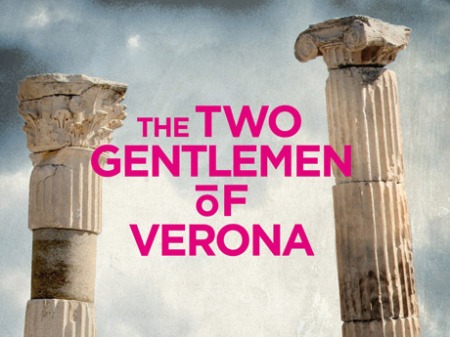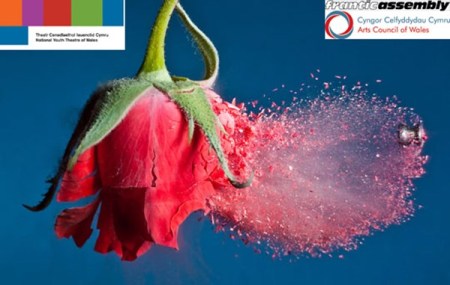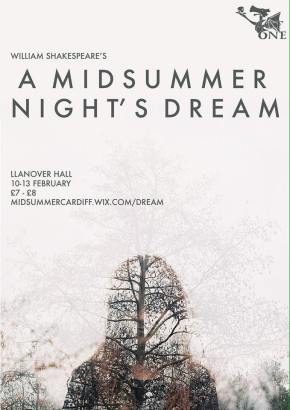The British Council and Chapter Arts Centre in Cardiff have teamed up to co-ordinate a number of exciting events to celebrate Shakespeare.

From the facebook event page:
As we commemorate 400 years of Shakespeare, we take a look at his legacy on film and the relevance of his stories in Wales and beyond with discussions, workshops and specially commissioned programme notes. Events co–ordinated by the British Council and Chapter Arts Centre as part of the Shakespeare Lives season celebrating the 400th anniversary of the bard’s death.
Henry V directed by Kenneth Branagh (15)
Sunday 3 April, 5pm
Panel discussion after the film: ‘Shakespeare and Wales’
On Shakespeare’s exploration of national identity and how this is relevant to us in Wales today. Panellists include Gwyneth Lewis, the inaugural National Poet of Wales; poet, editor and literary critic Grahame Davies; Rakie Ayola it will be chaired by Cardiff-based Shakespearian actress and Siobhan Brennan a postgraduate student specialising in Shakespeare and Wales.
Macbeth starring Michael Fassbender (15)
Sunday 10 April, 5pm
Panel discussion after the film: ‘Shakespeare and the Union’
Curated by Siobhan Brennan, how Shakespeare’s Scottish play helps us to explore ideas of national identity in post–devolutionary Britain. Panellists include Phil George, producer of ‘Shakespeare: the King’s Playwright’, and Professor Andrew Murphy of St Andrews University, editor of ‘Shakespeare and Scotland’.
West Side Story (PG)
Sunday 17 April, 5pm
Panel discussion after the film: ‘Shakespeare and the Musical’
Chaired by Rebecca Gould, Head of Arts British Council Wales on our enduring fascination with Shakespeare and his influence on musicals on stage and film.
Ran, adaptation of King Lear directed by Akira Kurosawa (12A)
Sunday 24 April, 5pm
Panel discussion after the film: How does the translation and adaptation of Shakespeare’s works keep him alive for us today?
Panellists include Dr Paul Prescott, convenor of the ‘Global Shakespeare’ degree at the University of Warwick, and Gwyneth Lewis Inaugural National Poet of Wales who has translated ‘The Tempest’ into Welsh.
Hamlet starring Maxine Peake
Sunday 1 May, 3.30pm
Panel discussion after the film: ‘Women and Cross-Casting in Shakespeare’. Featuring Yvonne Murphy, Creative Director of the all-female Shakespearian troupe Omidaze Productions, renowned Shakespeare academic Professor Carol Rutter, and Shakespearian actress Lisa Zahra.
Find out more from Chapter
Extended Programme:
Bill (PG)
Saturday 2 April – Thursday 7 April
Gnomeo & Juliet (U)
Friday 8 April-Sunday 10 April
The Lion King (U)
Saturday 16 April-Sunday 24 April
Chapter 13 presents: Theatre of Blood (15)
Monday 18 April, 6pm
My Own Private Idaho (15)
Tuesday 19 April
10 Things I Hate About You (12A)
Saturday 23 April
Live: Shakespeare 400
Saturday 23 April
Richard III (15)
Thursday 28 April, 7:30pm.
Cinderella (U)
Saturday 30 April-Sunday 1 May
Wrth i ni ddathlu 400 mlynedd ers marwolaeth Shakespeare, rydym yn edrych ar ei etifeddiaeth ar ffilm, a pherthnasedd cyfoes ei straeon yng Nghymru a thu hwnt gyda thrafodaethau, gweithdai a nodiadau rhaglen a gomisiynwyd yn arbennig. Cydlynir y digwyddiadau gan y British Council a Chanolfan Gelfyddydau Chapter fel rhan o dymor ‘Shakespeare Lives’ i goffáu 400 mlynedd ers marwolaeth y bardd.
Henry V wedi’i chyfarwyddo gan Kenneth Branagh
Dydd Sul y 3ydd o Ebrill, 5yh
Trafodaeth ar ôl y ffilm : ‘ Shakespeare a Chymru’
Curadir gan Siobhan Brennan. Fe fydd trafodaeth ynglŷn â defnydd Shakespeare o hunaniaeth genedlaethol, a sut mae hyn yn berthnasol i ni yng Nghymru heddiw. Mae’r cyfranwyr yn cynnwys Gwyneth Lewis, Bardd Cenedlaethol Cymru cyntaf; y bardd, golygydd a beirniad llenyddol Grahame Davies; Rakie Ayola, actores Shakespearaidd o Gaerdydd, a Siobhan Brennan, myfyrwraig ôl-raddedig sy’n arbenigo ar Shakespeare a Chymru.
Macbeth gyda Michael Fassbender
Dydd Sul Ebrill y 10ed, 5yh
Trafodaeth ar ôl y ffilm : ‘ Shakespeare a’r Undeb’
Curadir gan Siobhan Brennan. Sut mae drama Albanaidd Shakespeare yn ein helpu i drafod syniadau o hunaniaeth genedlaethol ym Mhrydain ôl- ddatganoledig? Mae’r cyfranwyr yn cynnwys Phil George , cynhyrchydd ‘Shakespeare : Dramodydd y Brenin’ , a’r Athro Andrew Murphy o Brifysgol St Andrews, golygydd ‘Shakespeare a’r Alban’.
West Side Story (PG)
Dydd Sul 17eg o Ebrill, 5yh
Trafodaeth ar ôl y ffilm : ‘Shakespeare a’r Sioe Gerdd’
Wedi’i chadeirio gan Rebecca Gould, fe fydd y drafodaeth hon am ein diddordeb parhaol yn Shakespeare a’i ddylanwad ar sioeau cerdd ar y llwyfan a ffilm.
Ran, addasiad o King Lear a gyfarwyddwyd gan Akira Kurosawa
Dydd Sul y 24ain o Ebrill, 5yh
Trafodaeth ar ôl y ffilm: ‘Cyfieithiad Shakespeare’
Sut mae cyfieithu ac addasu dramâu Shakespeare yn ei gadw o’n fyw i ni heddiw? Mae’r cyfranwyr yn cynnwys Dr Paul Prescott, cynullydd o’r modiwl ‘Global Shakespeare’ ym Mhrifysgol Warwick, a Gwyneth Lewis, Bardd Cenedlaethol Cymru gyntaf, sydd wedi cyfieithu ‘The Tempest’ i’r Gymraeg.
Hamlet gyda Maxine Peake
Dydd Sul y 1af o Fai, 3.30yh
Trafodaeth ar ôl y ffilm: ‘Merched a Chroes-Castio yn Shakespeare’
Fe fydd y cyfranwyr yn cynnwys Yvonne Murphy, Cyfarwyddwr Creadigol cwmni Shakespeare oll-ferched Omidaze Productions, yr Athro Carol Rutter, yr arbenigwraig academaidd enwog ar Shakespeare, a’r actores Shakespearaidd Lisa Zahra.










